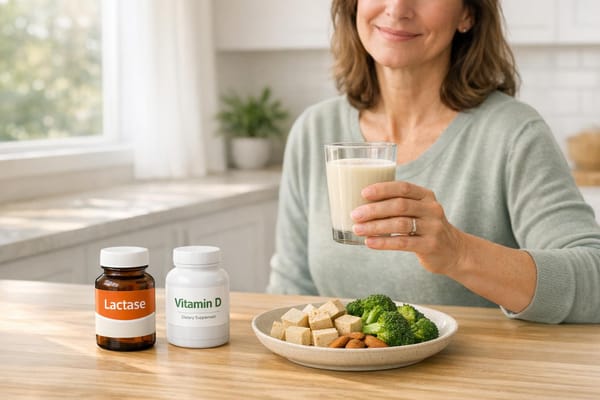Daily Vitamin D Needs for Lactose-Intolerant Pregnant Women
Learn how lactose-intolerant pregnant women can meet their vitamin D needs for healthy bone development and maternal well-being.

Lactose-intolerant and pregnant? Meeting your daily vitamin D needs is crucial for your baby's bone development and your own health. Here’s how you can manage:
- Recommended intake: 600 IU (15 mcg) of vitamin D daily during pregnancy.
- Non-dairy sources: Fatty fish (salmon, tuna), UV-treated mushrooms, fortified cereals, and orange juice.
- Supplements: Vitamin D supplements or lactase enzyme pills (e.g., Milktab) can help if dairy is hard to digest.
- Monitor levels: Regular blood tests (once per trimester) ensure you're on track.
- Sunlight exposure: Safe sun exposure can naturally boost vitamin D.
Talk to your healthcare provider to find the best approach for you and your baby.
Top 10 Vitamin D Foods Every Pregnant Woman Should Eat #pregnancy #health #shortsfeed
Why Vitamin D Matters in Pregnancy
Vitamin D plays a key role during pregnancy by supporting the health of both the baby and the mother. This is especially important for women who are lactose intolerant, as they need to find other ways to get enough vitamin D.
Effects on Baby's Development
Vitamin D helps the baby absorb calcium, which is important for building strong bones. It also plays a role in developing the baby's immune system, laying the groundwork for a healthy start in life. At the same time, vitamin D helps the mother stay healthy by meeting her increased nutritional demands during pregnancy.
Importance for Maternal Health
Pregnant women who can't consume dairy may find it harder to get enough vitamin D. To maintain their health, they should consider alternative sources or supplements to ensure they meet their needs.
How Much Vitamin D Pregnant Women Need
Pregnant women in the United States are recommended to get 600 IU (15 micrograms) of vitamin D each day to support both their health and their baby's development. For those who are lactose intolerant, meeting this daily amount can be more challenging. Non-dairy sources of vitamin D and supplements are often key alternatives. It's a good idea to consult a healthcare provider to explore the best options for your specific needs.
Problems for Lactose-Intolerant Mothers
Effects of Avoiding Dairy
Cutting out dairy during pregnancy can increase the risk of vitamin D deficiency. It also lowers the intake of calcium, protein, and vitamin B12, all of which are essential for both mother and baby. This makes planning a balanced diet especially important.
Meeting Nutritional Needs
You don’t have to completely avoid dairy to manage lactose intolerance. Lactase enzyme supplements can help you digest dairy while maintaining important nutrient levels. For instance, Milktab lactase pills are designed to break down lactose effectively. A supplement with 27,000 FCC units of lactase can handle the lactose in most dairy servings.
- Take enzyme supplements right before consuming dairy.
- Start with small amounts of dairy to test your tolerance.
- Keep track of how your body reacts to different dairy products.
Other Ways to Get Vitamin D
Foods with Vitamin D
You can add a variety of foods to your diet to help meet your vitamin D needs. Fatty fish like salmon is an excellent source, along with other options like mackerel, tuna, sardines, and halibut. For smaller amounts, free-range egg yolks are a good choice. Fortified foods such as cereals and orange juice can also help increase your intake. If you prefer plant-based options, UV-treated mushrooms are worth considering - just check for labels that say "UV-treated" or "vitamin D-enriched." And if these foods still don’t meet your needs, supplements can help fill the gap.
Vitamin D Supplements
If your diet doesn’t provide enough vitamin D, supplements are a reliable option. Be sure to talk to your healthcare provider to figure out the right dosage for you.
Handling Lactose Intolerance While Pregnant
Managing lactose intolerance during pregnancy is essential for meeting your nutritional needs, especially when it comes to vitamin D. The good news? You can still get enough vitamin D without relying on dairy. By incorporating non-dairy sources, monitoring your levels, and considering lactase enzyme supplements, you can maintain a healthy nutrient balance.
Lactase Enzyme Supplements
Lactase enzyme supplements can make it easier to include dairy in your diet, even if you're lactose intolerant. For instance, products like milktab are designed to help with dairy digestion. These supplements allow you to consume dairy while still getting essential nutrients.
Here’s how to use them effectively:
- Take the supplement right before consuming dairy.
- Follow the usage instructions carefully.
- Always check with your healthcare provider before starting any new supplement.
These steps, combined with regular vitamin D monitoring, can help you stay on track nutritionally throughout your pregnancy.
Monitoring Vitamin D Levels
Keeping track of your vitamin D levels is crucial during pregnancy, especially if you’re lactose intolerant. Your healthcare provider can recommend blood tests - often once per trimester - to ensure your levels are where they need to be for both you and your baby. Along with supplements and fortified foods, spending some time in the sun (safely) can also help boost your vitamin D.
Conclusion
Managing vitamin D levels during pregnancy when dealing with lactose intolerance takes careful planning. Ensuring proper vitamin D intake is important for the health of both the mother and the baby.
Lactase enzyme supplements, such as milktab, can help break down dairy products, allowing you to benefit from their vitamin D and nutrients without discomfort. Incorporating these supplements alongside other sources of vitamin D can help lactose-intolerant mothers maintain balanced nutrition throughout pregnancy.
FAQs
How can pregnant women with lactose intolerance meet their daily vitamin D needs without dairy?
Pregnant women with lactose intolerance can maintain healthy vitamin D levels through a few practical strategies. Vitamin D-fortified foods such as certain cereals, orange juice, and plant-based milks (like almond or soy milk) are excellent options. Vitamin D supplements are another effective choice and should be taken under the guidance of a healthcare provider. Additionally, spending time outdoors in sunlight can naturally boost vitamin D production in the body. Always consult with your doctor to determine the best approach for your specific needs.
How can pregnant women safely use sunlight to support healthy vitamin D levels?
Sunlight is a natural and effective way to help your body produce vitamin D, which is essential for both you and your baby during pregnancy. When your skin is exposed to sunlight, it triggers vitamin D synthesis, but it's important to practice safe sun habits.
To get the benefits without increasing the risk of skin damage, aim for short periods of sun exposure, typically 10–15 minutes a few times a week, depending on your skin type, time of day, and location. Always avoid prolonged exposure during peak hours (10 a.m. to 4 p.m.) and use sunscreen for extended outdoor activities to protect your skin from harmful UV rays. If you're concerned about getting enough vitamin D, consult your healthcare provider about supplements or dietary options.
Why is it important for pregnant women with lactose intolerance to monitor their vitamin D levels, and how often should they check them?
Maintaining healthy vitamin D levels during pregnancy is essential for supporting your baby’s bone development, immune system, and overall health. For women with lactose intolerance, it can be harder to get enough vitamin D from dietary sources like fortified dairy products, making monitoring even more important.
Doctors typically recommend checking vitamin D levels during routine prenatal visits, especially if you have risk factors like limited sun exposure or dietary restrictions. Speak with your healthcare provider to determine the best testing schedule and whether supplementation is necessary to meet your daily needs.



